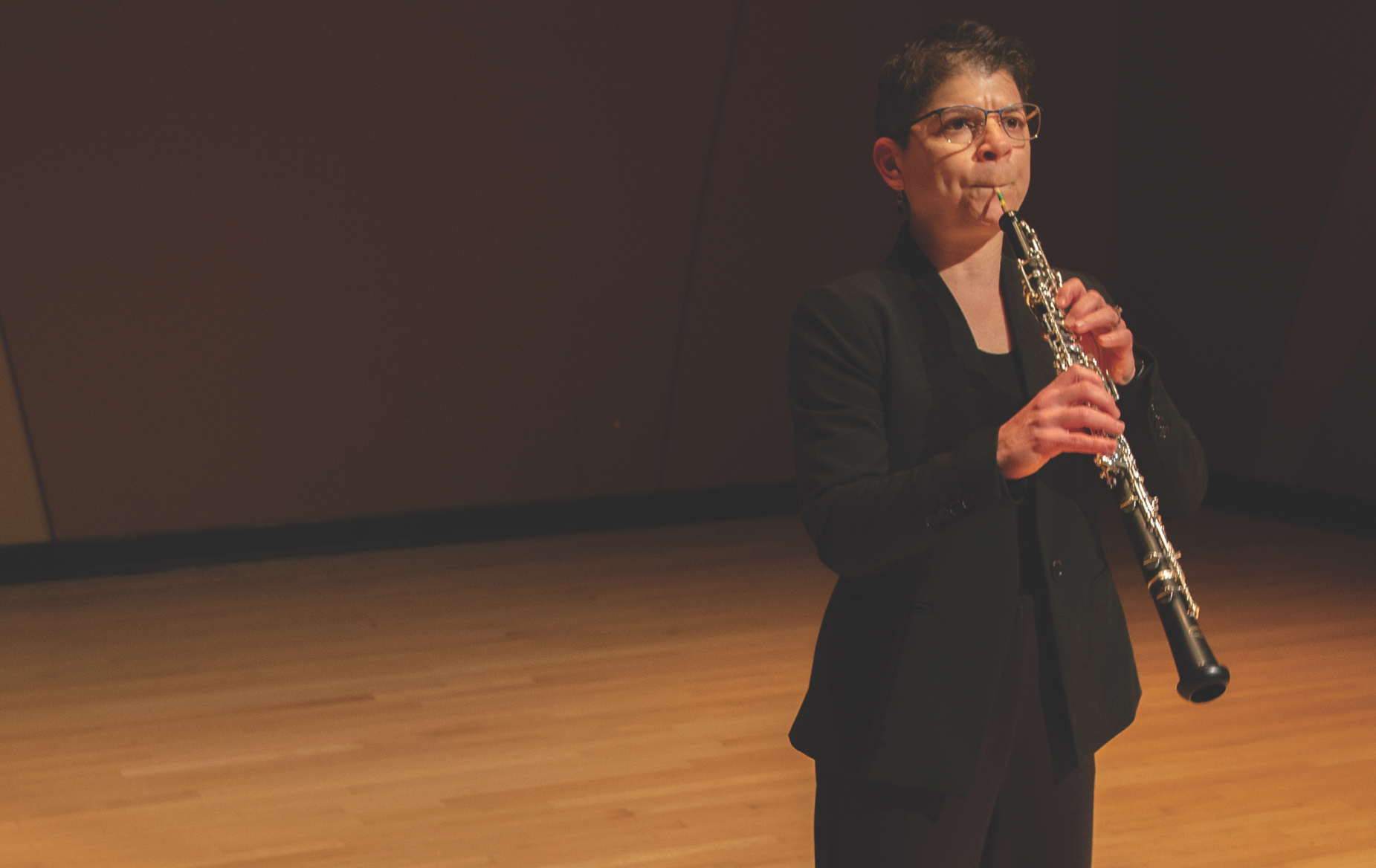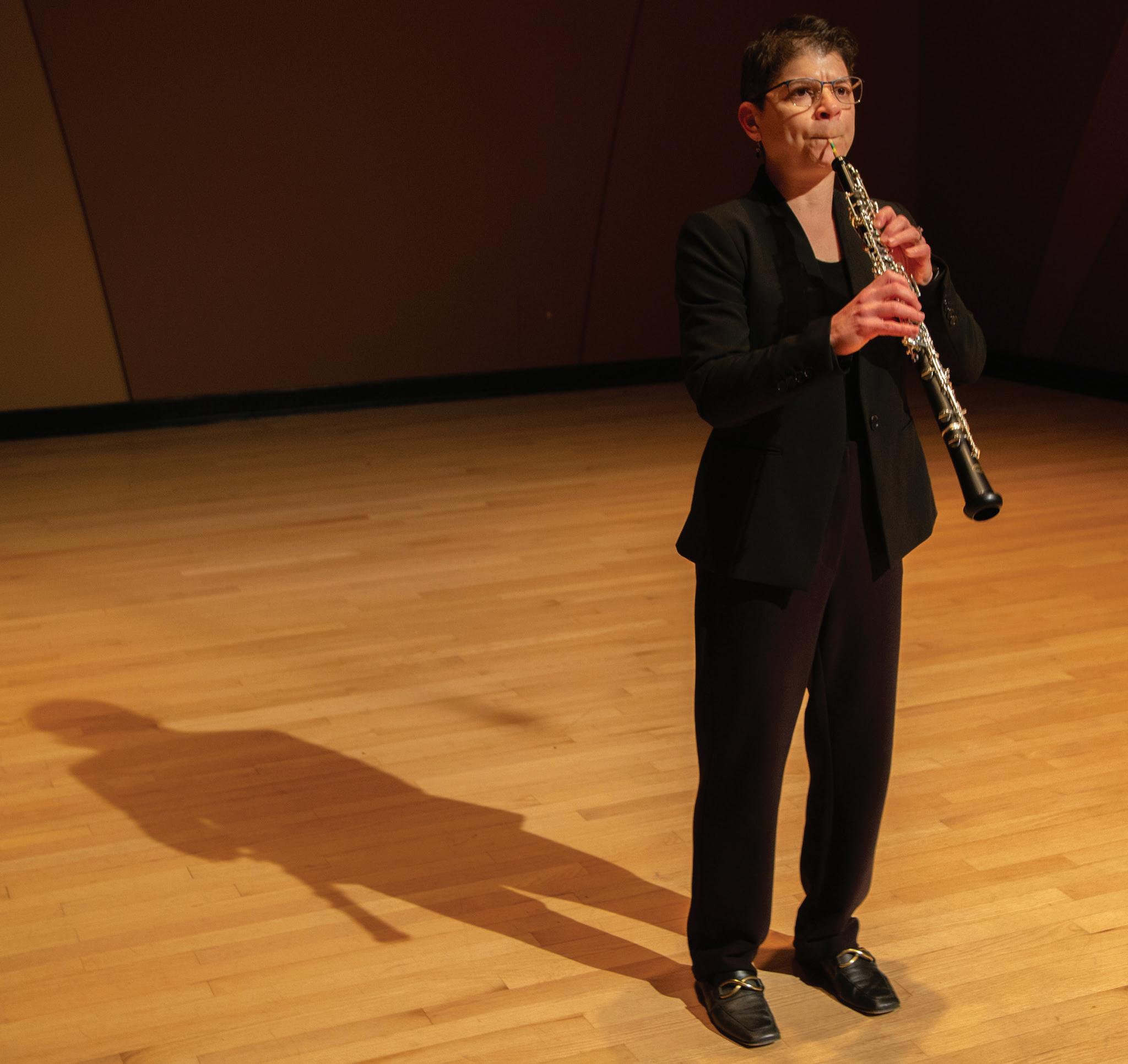
5 minute read
The Cost of Comfort
By Karen Augé
Regis instructor pays tribute to artists who brought healing after 9/11
Miriam Kapner recalls the piercing, toxic smell that lingered at Ground Zero for weeks. She remembers the faces in photographs smiling out from haunting — and by then, hopeless — flyers taped up seemingly everywhere by people desperate to find missing loved ones.
What Kapner — now an affiliate oboe instructor at Regis — doesn’t remember is what she played the morning she joined dozens of artists and musicians who gave their time and risked their health to comfort the first responders sifting through rubble in the aftermath of the September 11 attacks. She doesn’t remember the music she played — with one exception.
“There was a firefighter…covered in ash. After we were done, he spoke up and said, ‘do you guys know Ave Maria?’”
Kapner and her woodwind quintet didn’t have the music, but their bassoonist began finding the notes from memory. Kapner joined, and the group poured out Franz Schubert’s worshipful, mournful music “as best we could by ear.”
More than two decades later, Kapner worked with University of Nevada Las Vegas film Prof. Brett Levner and her students — many of whom weren’t yet born when terrorists flew planes into the World Trade Center, and none of whom are old enough to remember that day — to tell the stories of some of those musicians and artists.
The resulting documentary short film, Out of the Darkness, which Kapner is executive producer of, and which she composed music for, has been selected for screening at the 15th New York City Independent Film Festival in June and at this summer’s Oregon Documentary Film Festival.
“I think that people don’t realize that musicians did so much in the days and weeks and months following 9/11, that musicians and artists were part of the recovery effort as well,” Kapner says in the film. “I think it’s important to pay tribute to people who go above and beyond.”
In the film, Kapner recalls her experience playing for first responders. But the stories of violinist Marya Columbia and visual artist Ken Cro-Ken are told mostly by the loved ones they left behind. Both spent months breathing the toxic air around Ground Zero and both died of lunch cancer, Columbia in 2019, Cro-Ken in 2020. “When Marya and Ken died so close together, and my brain made the connection of, ‘oh, this is why they died,’ I thought there should be a lasting tribute to their work and to their courage,” Kapner said in an interview.
The crisp fall morning when the towers fell and the world changed, Kapner was unpacking, trying to get settled in a new apartment uptown. Months earlier, she had completed her master’s degree at the Manhattan School of Music, and was building a career as a freelance oboist in New York, her hometown.
Later, when the call went out for volunteers to play at St. Paul’s Chapel, blocks from Ground Zero, Kapner said she didn’t hesitate. “We all felt so helpless. We didn’t know what to do. That was one thing I knew I could do,” she says in the film.
Marya Columbia spent eight months playing at St. Paul’s. The chapel, blocks from Ground Zero, survived the attacks, much as it escaped a fire that swept through lower Manhattan on a September night in 1776. In 2001, it became an impromptu rest station for first responders, where they could grab a bite to eat or take a quick nap. And listen to music.
Out of the Darkness includes brief portions of an interview Columbia gave shortly before she died. “Music, if nothing else, gives comfort to people who have nothing else,” she says. She is sitting on a couch, her gaunt frame wrapped in a blanket, her head swathed in a purple scarf, her voice is raspy and weak. “I feel really good that I brought at least some people during those eight months some comfort.”

Miriam Kapner, oboe instructor at Regis, performs at Regis
Photo by Skip Stewart
After Columbia was diagnosed with advanced lung cancer in 2018 — a freelance musician like Kapner, Columbia had no health insurance — she applied for free care as a responder under the World Trade Center Health Program, but initially was denied, the New York Times reported. She finally gained coverage as she entered hospice care, the Times stated in her obituary.
For Kapner, good fortune and good friends helped make the film possible by reducing the usually enormous cost of movie-making. Regis Associate Professor of music, Trudi Wright, Ph.D., made campus recording space available. And Levner, an old friend, who is also an experienced filmmaker, transformed Kapner’s idea into a semester project for her students at UNLV. “I feel extremely grateful to her and to her students. Without them, the film would have gone no further than scribblings in my notebook,” she said.
Now, Kapner hopes that gaining an audience at the New York City film festival will help Out of the Darkness attract distributors. Ultimately, she hopes to raise money to expand it from a 15-minute short to a full-length feature film, and tell more musicians’ and artists’ stories. In the meantime, the film is “on the short list of things I’m really proud of,” she said.
One other thing on that list: playing Ave Maria for that firefighter, whose name Kapner never knew.
In the film, she says the moment provided “two forms of pride. Proud that he asked me, proud that we were able to give him what he needed, at least for 30 seconds, for a minute and a half.”










